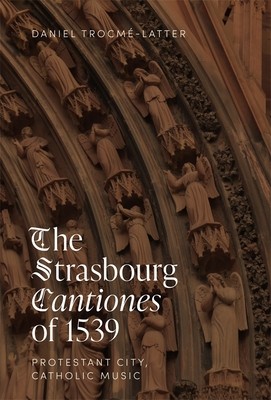
- We will send in 10–14 business days.
- Author: Daniel Trocmé-Latter
- Publisher: Boydell Press
- ISBN-10: 1837650667
- ISBN-13: 9781837650668
- Format: 15.6 x 23.4 x 2.4 cm, hardcover
- Language: English
- SAVE -10% with code: EXTRA
The Strasbourg Cantiones of 1539: Protestant City, Catholic Music (e-book) (used book) | bookbook.eu
Reviews
Description
Schöffer's Cantiones tell a fascinating story of South-North, Catholic-Protestant co-operation.
The Cantiones quinque vocum selectissimae (Strasbourg: Peter Schöffer the Younger, 1539) is a collection of 28 Latin five-voice motets by composers including Gombert, Willaert, and Jacquet of Mantua. This was Schöffer's first book of Latin motets as well as his last ever musical publication; he was granted an imperial privilege to print it by King Ferdinand I. The contents of the anthology had been sent to Schöffer by Matthias Hermann Werrecore, the choirmaster of the Duomo of Milan. However, this was at a time when no liturgical Latin choral singing took place in Strasbourg, following one of the harshest reformations - musically-speaking - of the continent. This book comprises a critical study of the Cantiones in terms of the circumstances of its assemblage and printing, its confessional significance, and the music itself. It considers the historical circumstances surrounding the publication of the Cantiones - including the nature of the connection between Schöffer and Werrecore, and why a Protestant publisher based in Protestant Germany would try to sell Latin music that was endorsed by a Catholic monarch and emphatically had no chance of being performed in its place of publication. In addition, this book includes considerations of the motets themselves, brief biographical details of the composers - including the lesser-known ones (e.g. Ferrariensis, Sarton, Billon) - and a full list of all concordant sources. It will be of interest to performers and scholars alike, combining elements of historical research, musical criticism and - via the transcriptions hosted online - performance.EXTRA 10 % discount with code: EXTRA
The promotion ends in 17d.23:27:23
The discount code is valid when purchasing from 10 €. Discounts do not stack.
- Author: Daniel Trocmé-Latter
- Publisher: Boydell Press
- ISBN-10: 1837650667
- ISBN-13: 9781837650668
- Format: 15.6 x 23.4 x 2.4 cm, hardcover
- Language: English English
Schöffer's Cantiones tell a fascinating story of South-North, Catholic-Protestant co-operation.
The Cantiones quinque vocum selectissimae (Strasbourg: Peter Schöffer the Younger, 1539) is a collection of 28 Latin five-voice motets by composers including Gombert, Willaert, and Jacquet of Mantua. This was Schöffer's first book of Latin motets as well as his last ever musical publication; he was granted an imperial privilege to print it by King Ferdinand I. The contents of the anthology had been sent to Schöffer by Matthias Hermann Werrecore, the choirmaster of the Duomo of Milan. However, this was at a time when no liturgical Latin choral singing took place in Strasbourg, following one of the harshest reformations - musically-speaking - of the continent. This book comprises a critical study of the Cantiones in terms of the circumstances of its assemblage and printing, its confessional significance, and the music itself. It considers the historical circumstances surrounding the publication of the Cantiones - including the nature of the connection between Schöffer and Werrecore, and why a Protestant publisher based in Protestant Germany would try to sell Latin music that was endorsed by a Catholic monarch and emphatically had no chance of being performed in its place of publication. In addition, this book includes considerations of the motets themselves, brief biographical details of the composers - including the lesser-known ones (e.g. Ferrariensis, Sarton, Billon) - and a full list of all concordant sources. It will be of interest to performers and scholars alike, combining elements of historical research, musical criticism and - via the transcriptions hosted online - performance.

Reviews